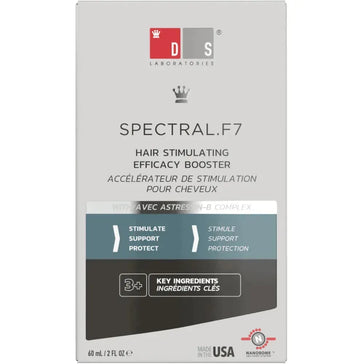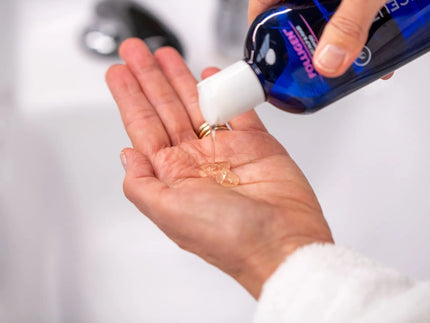Hormonal contraceptives and their effect on hair
Hair loss caused by contraceptives is an unpleasant problem that affects many women. However, not all contraceptives are directly linked to increased hair loss in women.
This largely depends on the extent to which the contraceptive is hormone-based. The extra hormones trigger certain processes in the cells via the receptors in the hair follicles.
For example, extra oestrogen can cause hair to grow longer, while androgens can cause hair loss or thicker, darker hair in some cases.
Every contraceptive that works by administering hormones therefore works in its own way — from the pill and the hormone patch to the hormone coil, the ring, hormone implants or even injections.
In any case, all hormonal contraceptives carry a risk of hair loss.
Not only does each contraceptive work through a different form of hormones and a different dosage, but it is also absorbed individually by each body, making it impossible to predict exactly how the body will react to the hormones.
Specific questions such as, ‘How severe will hair loss be after stopping the Maxim pill?’ cannot therefore be answered precisely, as even the effect of the same pill can vary greatly from person to person.
Hair loss caused by the pill
When we think of hormonal contraceptives, the contraceptive pill naturally comes to mind first. As an oral contraceptive, it is one of the most popular contraceptives in the world, but it is also heavily criticised due to its long list of possible side effects.
Hair loss after stopping the pill or even oily hair after stopping the pill are just as likely as hair loss caused by the pill while taking it.
This depends greatly on the effect of the progestogen used: Androgenic progestogens tend to activate the receptors, which can lead to oily hair or excessive hair growth.
In certain cases, a specific hormone preparation can therefore be used for this purpose, so that the contraceptive pill can be used to combat hair loss.
In this context, the progestogen desogestrel is known to reduce hair loss and is therefore often given to patients suffering from hair loss.
However, other combinations of ingredients and progestogens can also weaken hair growth and make the hair less oily. It is therefore important to consider the appropriate active ingredients in each individual case.
Advice personalized to your hair needs
Take our Hairtest to find the best products for your hair within 2 minutes!
Hair loss due to other contraceptives
Of course, the pill is not the only contraceptive that has a strong effect on hair and is known to cause hair loss in women.
Any contraceptive that works through hormones disrupts the body's natural hormone balance and therefore affects the hair.
Hormone implants based solely on progestogen and high-dose hormonal IUDs containing the active ingredient levonorgestrel are always a focus of attention, as their use can lead to severe changes in the hair in some cases.
Levonorgestrel, for example, can promote hair loss or cause excessive hair growth in unwanted areas of the body. The contraceptive injection is also known to significantly increase the risk of hair loss.
Little research has been done on other contraceptives such as the contraceptive ring or patch, so not much is known about their link to hair loss.
What is certain is that everyone should consult a doctor to find the right contraceptive method for them. When using hormonal contraceptives, it is worth observing the effect on the hair, as this can vary greatly from person to person.
Remedies for hair loss
Do you suffer from hormone-induced hair loss in women? Then it is advisable to use a hair growth stimulating product that can reduce hair loss while using the contraceptive method in question or even thicken the hair after stopping the pill, for example.
The clinically tested Spectral.CSF Lotion and Spectral.F7 Lotion are ideal for this situation, as they activate hair growth and deliver welcome results: even after hair loss caused by the pill, hair grows back and becomes full and strong. They are also very beneficial for the scalp as they relieve dandruff and itching.













